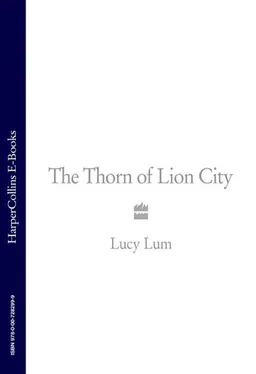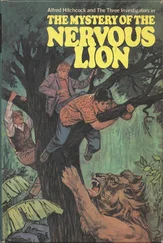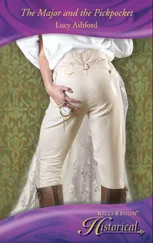LUCY LUM
A MEMOIR
In memory of my father , Lum Poh-mun
Title Page LUCY LUM
Dedication In memory of my father , Lum Poh-mun
Chapter One Chapter Two Chapter Three Chapter Four Chapter Five Chapter Six Chapter Seven Chapter Eight Chapter Nine Chapter Ten Chapter Eleven Chapter Twelve Chapter Thirteen Chapter Fourteen Chapter Fifteen Chapter Sixteen Chapter Seventeen Chapter Eighteen Chapter Nineteen Chapter Twenty Chapter Twenty-One Chapter Twenty-Two Chapter Twenty-Three Chapter Twenty-Four Chapter Twenty-Five Chapter Twenty-Six Acknowledgements About the Author Copyright About the Publisher
One
‘Look at the red-haired devil’s air-raid shelter,’ Popo said, pointing to our neighbour’s garden. ‘How clever he is. So different from your father. It is like a house, their shelter, with camp beds and chairs, a wireless and lights. And so pretty outside, with tapioca, sugar cane and all those flowers.’
For weeks my grandmother Popo had told us that we were not to worry: the Japanese would never capture Singapore because the British would turn back the invaders. ‘Life will go on as normal,’ she said. But there were soldiers on every street, in the shops and the cinema. Every rickshaw had a soldier inside it. There were air-raid drills, and people dug in their gardens, building makeshift bomb shelters. You could tell how big a family was from the size of the mound of soil in the garden. Some of the shelters were like little foxholes, covered with wooden planks, branches and earth, but in our street the red-haired devil’s shelter was the biggest and best, and we were jealous. He was the English officer in charge of the police station where Father worked. His wife and children had been evacuated to England and he told Father that if the bombs came we could hide in his shelter with him and be safe.
Father said we did not need a hole under the earth to hide in. Instead he put the heavy teak table in the middle of the bedroom, then piled blankets and three kapok mattresses on top. He put more mattresses round the sides. He said these would stop the flying shrapnel and the ceiling crashing down on us. ‘If the bombs come, you won’t need to run outside to our neighbour’s garden. You can jump from your beds and curl up under the table. You must have fresh water and biscuits at the ready in your satchels,’ he said. ‘There will be no time to waste.’ When he talked to us about the bombs he was careful not to catch Popo’s or Mother’s eye. He was frightened of them. They did not like him telling them what to do.
My brothers, my sisters and I looked forward to the air-raid drills. We thought they were games. We five would grab our satchels, as Father had told us, race to the bedroom and dive under the table. It was dark and snug in there and we would play for hours. Sometimes Father would tell us stories about the island his family came from, Hainan, and we would listen and munch our biscuits.
I was seven, and no one explained anything to me. I was frightened of Popo too. Father told me that we should call her Waipo, Outside Grandmother, because she was our mother’s mother, not his. But if we called her Waipo she beat her chest and told us she would kill herself. ‘This old bag of bones has lived too long,’ she would say. ‘Even my grandchildren do not love me.’
One day I was brave: I asked Popo who the invaders were and why they wanted to attack Singapore. She went to a cupboard, pushed aside the piles of paper and the tiny red purses in which she kept the dried umbilical cords of her children and grandchildren, and pulled out a great map of the world. It was yellow with age and almost falling to pieces, but she spread it on the table in front of her.
‘Listen,’ she said, lowering herself into her favourite armchair. ‘My mother told me this story when I was a child. The mulberry tree is covered with rich and delicious leaves, which the silkworm likes. This is China,’ she said, pointing to a huge pink country on the map. ‘It is a country of plenty, like the mulberry tree with its leaves, but it is plagued by starving Japanese silkworms from across the sea.’ She rapped her knuckles on the islands of Japan, which crawled across the blue sea towards China. ‘The silkworms have hardly any food and their greedy eyes are fixed on China where there is plenty. That is why they attack. To devour us.’
Popo told me of the long history of fighting between China and Japan, about how the Japanese invaded French Indochina, about things I didn’t understand then – economic sanctions and oil embargoes, Japan wanting more oil and planning to steal it from Borneo, only four hundred miles to the east, but Singapore was in the way. And she told me of a British man called Raffles, who came in 1819 and wasn’t frightened of the swamps and marshes. He had taken control of the narrow strait between Malaya and Java, and borrowed Singapore from the Sultan of Johor. She told me of how the British had come to Malacca and Penang, Labuan and, most of all, to Singapore, and how the Chinese had come too, from Fukien, Swatow and Kwantung, where she and her husband Kung-kung had been born. She told me all of this, and then she spat, ‘The filthy Japanese! They have killed many Chinese and we will always be their enemies.’
We lived in British government quarters and our house in Paterson Road was across the street from where Father worked. The house was divided into flats. We had the ground floor and a Malay police inspector lived upstairs with his family. The red-haired devil said they, too, could come into his air-raid shelter if the bombs fell. Our house was square and had wide verandas shaded with bamboo blinds. Inside we had three bedrooms, a sitting room and another room for the servants. In the garden there were hibiscus, papaya, banana, cherry and jackfruit trees, and an oriental henna with leaves shaped like little lances; the Malay women in the kampung at the back of our house came to us to ask for the henna leaves and I would watch them stain their palms and fingers for weddings and other ceremonies.
The Malay cemetery, with its lines of numbered round headstones, was next door. It was for Muslims so there were no plants or flowers. From my bedroom window I could see the Chinese cemetery on a hillock across the road, the graves terraced with marble and mosaic. Popo had told me that the richer the family, the more elaborate their ancestor’s resting-place; sometimes we played hide and seek among the graves, and when I hid, I would remember the dead all around me and not want to play any more.
A huge durian tree stood at the bottom of the Chinese cemetery; it was the tallest tree I had ever seen, fifty or sixty feet tall, perhaps more. No one dared climb it to pick the fruits, but waited for them to fall to the ground. In season, the abundance of spiny-shelled durians, hanging high in the tree, made people stare. Then the tree’s owner would hire two guards to stop anyone helping themselves to the fruit. Sometimes the guards left the tree, and when strong winds brought down the durians, the boys from the kampung ran to pick them up. We loved the sweet custardy pulp, and I asked Popo if I could search the ground beneath the tree before the guards arrived in the morning. But she told me, ‘We cannot eat fruit from that tree because it is different. The fei-shui from all those dead people feed and sustain it and we don’t eat the fei-shui of dead people.’
The Malay children upstairs wouldn’t play with us in the garden. When they came to visit, they would not eat or drink. When they cooked for us we ate their tasty food, and we couldn’t understand why they wouldn’t eat ours. Father told me about the Prophet Muhammad, and how Muslims could not eat blood or pork, or food that had been offered in prayers. Whenever Popo and my mother went to Chinatown, they would bring back meat and hang it on a bamboo pole in the garden to dry; in the heat, the fat would melt off the bacon and the pork sausages and drip to the ground. Father said the Malay children would not play in our garden because the soil had in it the fat of pigs.
Читать дальше












